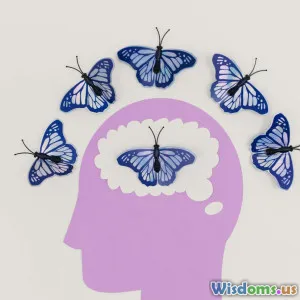
Unlocking Your Brain The Science of Multilingualism Explained
6 min read Explore how multilingualism reshapes your brain, enhancing cognition, memory, and creativity through cutting-edge science. (0 Reviews)
Unlocking Your Brain: The Science of Multilingualism Explained
Language is more than words—it’s the essence of human connection and thought. Yet, mastering more than one language isn't just a cultural or social asset; it profoundly influences how your brain functions and grows. Welcome to the vibrant science of multilingualism, where unlocking your brain’s potential transcends language itself.
The Multilingual Brain: A Symphony of Cognitive Flexibility
Unlike monolingual brains operating within a single linguistic framework, multilingual brains juggle diverse systems simultaneously. This orchestration demands cognitive flexibility—the brain's ability to switch between languages, filtering out irrelevant information to speak fluently without confusion.
Cognitive Control and the Bilingual Advantage
Several studies, such as those published in Psychological Science, have demonstrated that bilingual individuals show enhanced executive functions. These include improved attention control, better problem-solving strategies, and increased multitasking capabilities. For example, bilingual children often outperform monolingual peers on tasks requiring conflict resolution and task-switching.
Neurological Correlates: How the Brain Adapts
Neuroimaging research highlights that multilingualism activates and even thickens the dorsolateral prefrontal cortex—an area responsible for executive functions. A landmark study in NeuroImage shows that early bilinguals have greater gray matter density in these regions, suggesting that managing multiple languages strengthens neural connections.
Benefits Beyond Language: Memory, Creativity, and Aging
Enhanced Working Memory
Multilingual people tend to have superior working memory, the mental workspace where information is temporarily held and manipulated. A study by Costa et al. (2013) found bilinguals excel in memory tasks involving switching attention and resisting distraction, thanks to constant mental juggling.
Creative Problem-Solving
Switching between linguistic systems encourages thinking outside conventional frameworks—a skill at the heart of creativity. This mental flexibility translates to innovative problem-solving approaches in diverse contexts, from everyday decisions to complex scientific reasoning.
Cognitive Reserve Against Aging and Dementia
Notably, multilingualism appears to build cognitive reserve, delaying the onset of aging-related mental decline. Research published in Neurology demonstrates that bilingualism can delay symptoms of Alzheimer's disease by up to 4.5 years compared to monolingual individuals, a testimony to the protective power of sustained cognitive engagement.
How Multilingualism Shapes Thought: Sapir-Whorf Hypothesis Revisited
The age-old question: Does language influence thought? The Sapir-Whorf hypothesis contends that language shapes cognition and perception. Multilingual experience enriches this interplay:
- Switching languages often means switching cultural frames, inviting diverse perspectives.
- Multilingual individuals report heightened meta-linguistic awareness, better understanding the mechanics of language.
- Emotional expression can differ based on the language context, revealing the deep ties between language and identity.
These phenomena illustrate that learning new languages is not only about words but about expanding mental horizons.
Real-World Insights and Examples
Case Study: The Polyglot Effect
Consider the example of polyglots like Steve Kaufmann, a renowned language learner fluent in over 15 languages. Kaufmann speaks of a feedback loop where each new language learning accelerates cognitive skills, motivating further languages and intellectual growth.
Education and Social Impact
Schools embracing bilingual education see benefits beyond language proficiency. According to a report by the American Council on the Teaching of Foreign Languages, students in dual-language programs exhibit stronger academic performance, cultural empathy, and better interpersonal skills.
Practical Tips for Unlocking Your Brain Through Multilingualism
- Start Early But It’s Never Too Late: While childhood offers a critical period for language acquisition, adult brains retain remarkable plasticity.
- Consistent Practice: Language skills thrive on active use—engage daily with listening, speaking, reading, and writing.
- Contextual Learning: Immerse in cultural contexts, which deepens understanding and retention.
- Leverage Technology: Apps like Duolingo, Memrise, or language exchange platforms facilitate accessible and stimulating practice.
- Celebrate Mistakes: Learning languages involves trial and error, essential for neural rewiring.
Conclusion: More Than Just Words
Multilingualism is a dynamic cognitive tool that shapes how we think, perceive, and interact with the world. Far beyond communication, it enhances brain function, nurtures creativity, and guards against cognitive decline. The science is clear—the more languages you embrace, the richer your mental landscape and lifelong brain health.
So, whether you're starting your first foreign language or adding your tenth, remember you're not just learning words—you're unlocking your brain's extraordinary capacity.
Unlock your linguistic potential today, and open the door to a more flexible, creative, and resilient mind.
Rate the Post
User Reviews
Popular Posts



















